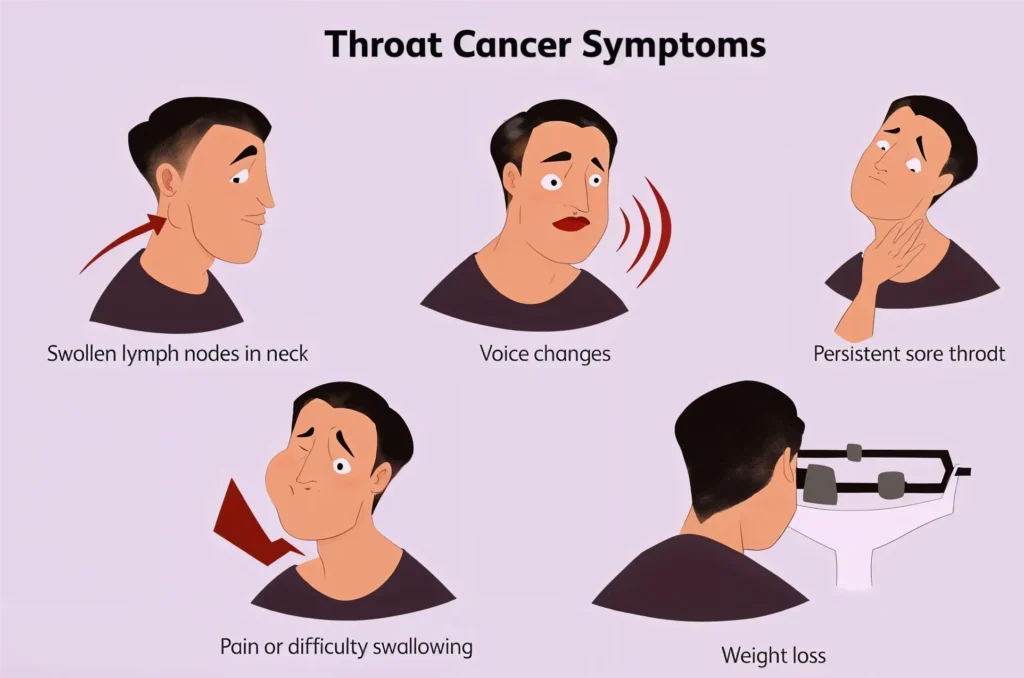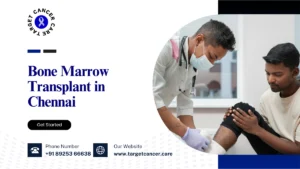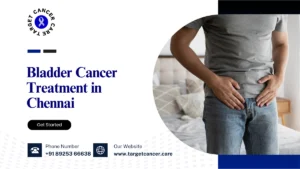When faced with a diagnosis of throat cancer, one of the most common questions is: Is throat cancer curable? The good news is that, in many cases, throat cancer can be treated successfully, especially if detected early. Treatment options like surgery, chemotherapy, and radiation therapy have helped many patients overcome the disease. However, as with any cancer, the chances of a successful outcome depend on several factors, including the stage of the cancer, its location, and the overall health of the patient. Understanding the factors that influence the prognosis of throat cancer is vital. In this blog, we will explore the key aspects of throat cancer treatment, survival rates, risk factors, and more.
Is Throat Cancer Curable?
Is throat cancer curable? This is one of the most common questions asked by people who are diagnosed with throat cancer. The answer depends on several factors, including the type and stage of cancer, as well as how early the cancer is detected. Throat cancer is curable in many cases, particularly if it is detected early and the appropriate treatment is applied. Early-stage throat cancer, when confined to the throat, often responds well to treatment, offering patients a chance at a full recovery.
Types of Throat Cancer
There are several different types of throat cancer, and each has its own treatment approach and prognosis. The two main types are:
- Laryngeal cancer: Cancer of the voice box.
- Pharyngeal cancer: Cancer of the throat.
Treatment options for these cancers typically include surgery, radiation, chemotherapy, or a combination of these. The earlier the cancer is diagnosed, the better the chances of success. However, is throat cancer serious in more advanced stages? In these cases, treatment may focus on controlling the disease and improving the quality of life rather than curing it.
What Are the Survival Rates?
Survival rates for throat cancer depend on the stage of diagnosis. For early-stage cancer, survival rates can be 80-90%. Can throat cancer be cured? In early stages, treatment is often effective, but if cancer spreads, survival rates drop significantly.
Here are some general survival rates for throat cancer:
- Early-stage throat cancer: Patients diagnosed with early-stage throat cancer typically have a survival rate of 80% or higher. This is due to the fact that the cancer has not spread, making it easier to treat.
- Advanced-stage throat cancer: For those with later-stage throat cancer, survival rates can drop to 40-50%. Is cancer in the throat curable? Though a complete cure is less likely, treatments like chemotherapy, radiation, and surgery can help control the disease and improve quality of life
Is throat cancer curable? It is highly treatable in the early stages, and with the right approach, many patients go on to live full lives after treatment.

What is the survival rate for throat cancer by stage?
Throat cancer, like most cancers, is classified by stages that indicate how far the disease has spread. The survival rate depends heavily on the stage at diagnosis. Early-stage detection greatly improves the chances of a successful outcome, especially when the cancer is localized and treated aggressively. Many people wonder, is throat cancer curable or can throat cancer be cured? The answer varies based on stage, health status, and treatment choices, but early detection dramatically increases survival chances.
Stage-by-Stage Survival Rate:
- Stage 0 (Carcinoma in Situ): The cancer is confined to the inner lining of the throat.
- Five-year survival rate is more than 90%.
- Early diagnosis often leads to complete remission with minimal treatment.
- Patients may not show symptoms, making regular screenings valuable when there are risk factors.
- Stage I: The tumor is limited to one part of the throat and is relatively small.
- Five-year survival rate is around 80–90%.
- Treatment options typically include radiation or surgery with minimal spread.
- Asking How to check for throat cancer at home? won’t provide reliable results at this stage—medical imaging and biopsy are key.
- Stage II: Cancer is slightly larger or may have spread to nearby areas but not to lymph nodes.
- Five-year survival rate ranges from 65–75%.
- Radiation and chemotherapy are often used together for better outcomes.
- Some patients report symptoms like persistent hoarseness—this was how a few realized How I knew I had throat cancer.
- Stage III: The tumor may involve multiple areas of the throat or nearby lymph nodes.
- Five-year survival rate drops to 50–60%.
- Combined therapy—surgery, radiation, and chemotherapy—is usually required.
- Throat pain, difficulty swallowing, or ear pain may alert patients to deeper issues.
- Stage IV (A, B, and C): Cancer has spread extensively, possibly to distant organs.
- Five-year survival rate ranges from 20–40%, depending on metastasis and response to treatment.
- Is throat cancer serious? Yes—especially at this stage, it can become life-threatening.
- While is cancer in the throat curable is still a hopeful question, outcomes depend on how well the body responds to aggressive treatments.
Early symptoms like a lump in the neck or a chronic sore throat should never be ignored. While self-exams may prompt someone to ask How to check for throat cancer at home, accurate diagnosis requires professional tools like a laryngoscope or biopsy. Survival is strongly influenced by how quickly medical help is sought, which often begins with the question: How I knew I had throat cancer.
What are the Signs and Symptoms of Throat Cancer?
Early detection of throat cancer improves the chances of successful treatment. Many people ask, Can throat cancer be cured?—and in early stages, the answer is often yes. Below are key symptoms to watch for:
Key Signs and Symptoms:
- Persistent Hoarseness: Ongoing voice changes or hoarseness lasting more than two weeks may indicate cancer in the vocal cords.
- Chronic Throat Pain: A sore throat that doesn’t go away, especially when paired with ear pain, could signal something serious.
- Difficulty Swallowing (Dysphagia): Feeling like food is stuck or painful swallowing may suggest a tumor is present in the throat.
- Lump in the Neck: A painless swelling in the neck may be an enlarged lymph node from throat cancer spread.
- Persistent Cough or Blood in Saliva: A stubborn cough or traces of blood should not be ignored, especially if it’s recurrent.
- Unexplained Weight Loss: Losing weight without trying can happen when swallowing becomes difficult or due to cancer metabolism.
If caught early, is throat cancer curable?—yes, often with good outcomes. Seek evaluation if these symptoms persist.
What are the Causes of Throat Cancer?
Several lifestyle and environmental factors contribute to throat cancer. Understanding them can help with prevention and early detection. When diagnosed early, is throat cancer curable? In many cases, yes.
Main Causes:
- Tobacco Use: Smoking or chewing tobacco exposes the throat to harmful carcinogens that can lead to cancer.
- Alcohol Abuse: Heavy alcohol use damages throat tissues. When combined with smoking, the risk increases significantly.
- HPV Infection: Human papillomavirus (especially HPV-16) is a key cause of throat cancer, particularly in younger adults.
- Poor Oral Hygiene and Diet: Poor dental health and a diet low in fruits and vegetables weaken tissue defenses.
- Chemical Exposure: Prolonged exposure to asbestos, wood dust, or industrial chemicals increases the risk in certain work environments.
Addressing these risk factors improves prevention. And yes, is cancer in the throat curable? — often, when detected early and treated promptly.
How is Throat Cancer Treated?
Throat cancer treatment depends on the stage, location, and overall health of the patient. Many ask, Is throat cancer curable?—and in early stages, it often is. The key lies in timely diagnosis and appropriate treatment.
Common Treatment Options:
- Radiation Therapy: Often used in early stages or after surgery, it targets cancer cells with high-energy beams.
- It can shrink or destroy tumors without major incisions.
- Side effects may include sore throat, dry mouth, or voice changes.
- Surgery: Tumors may be removed through endoscopic procedures or open surgery.
- Small tumors can be removed with lasers.
- Advanced cases might require removal of parts of the larynx or pharynx.
- Chemotherapy: Used in combination with radiation or surgery, especially in advanced stages.
- It helps kill remaining cancer cells or shrink tumors before surgery.
- Common side effects include fatigue, nausea, and hair loss.
- Targeted Therapy: Focuses on specific proteins in cancer cells to stop their growth.
- Cetuximab is a common drug used for throat cancers.
- Usually has fewer side effects than chemotherapy.
- Rehabilitation and Follow-Up: Post-treatment support includes speech therapy and regular scans.
- Recovery may include voice restoration or swallowing therapy.
- Lifelong follow-up ensures cancer does not return.
For many, the first signs—like a lump or persistent pain—answered the question How I knew I had throat cancer. While How to check for throat cancer at home is not accurate, noticing persistent symptoms should prompt a professional diagnosis. Early treatment increases the chance of a cure.
What is the Life Expectancy for Someone with Throat Cancer?
Life expectancy depends on the cancer stage, treatment, and overall health. Is throat cancer curable? — yes, especially in early stages.
Life Expectancy by Stage:
- Stage 0 & I: Survival rate is 80–90%. Symptoms like hoarseness often help with early detection. Many say, How I knew I had throat cancer began with voice changes.
- Stage II & III: Survival ranges from 60–75%. Aggressive treatment improves outcomes, but long-term care is essential.
- Stage IV: Survival drops to 20–40%. Treatment can extend life, but outcomes vary. Some Stage IV-A cases may still be curable.
How to check for throat cancer at home isn’t reliable; medical evaluation ensures accurate diagnosis and better survival chances.
How Can I Reduce the Risk of Throat Cancer?
Reducing throat cancer risk involves lifestyle changes and awareness. Though self-checks may raise concern, How to check for throat cancer at home isn’t reliable for diagnosis—professional screening is key.
Prevention Tips:
- Avoid Tobacco and Limit Alcohol: Quit smoking and reduce alcohol intake to lower throat cancer risk significantly.
- Get the HPV Vaccine: HPV is a leading cause. Vaccination can prevent virus-related throat cancers.
- Maintain Good Oral Hygiene: Regular dental care reduces chronic inflammation and infection in the mouth and throat.
- Eat a Healthy Diet: A diet rich in fruits and vegetables boosts immunity and reduces cancer risk.
Many discover symptoms late and reflect on How I knew I had throat cancer. Awareness and prevention save lives.
Do Throat Cancers Typically Recur?
Throat cancer, like many cancers, can sometimes return after treatment. This is more likely if the cancer was diagnosed at a later stage or if the tumor was not completely removed. Recurrence may happen in the same area or in distant parts of the body.
Patients who have undergone treatment should have regular follow-up appointments to monitor for signs of recurrence. Early detection of recurrence can lead to more effective treatments.
Is throat cancer curable? If cancer recurs, the treatment options and prognosis depend on how early the recurrence is detected and whether it can be effectively controlled.
How Can Lifestyle Changes Help?
- Quit Smoking: Quitting smoking significantly reduces the risk of throat cancer and other cancers.
- Limit Alcohol Consumption: Reducing alcohol intake lowers the risk of throat cancer and improves overall health.
- Diet & Exercise: Eating a healthy diet with fruits, vegetables, and antioxidants, along with regular exercise, strengthens the immune system and supports recovery.
is cancer in the throat curable While lifestyle changes alone cannot cure throat cancer, they can improve overall health and help in recovery following treatment.
Conclusion
Is throat cancer curable? Yes, throat cancer is curable, particularly when caught early. Treatment options such as surgery, radiation, and chemotherapy have proven effective in treating throat cancer and improving survival rates. However, early diagnosis and intervention are key to improving outcomes.




